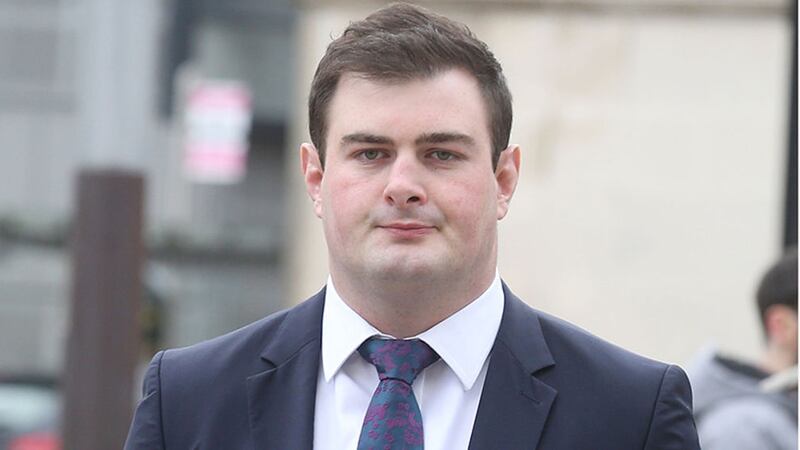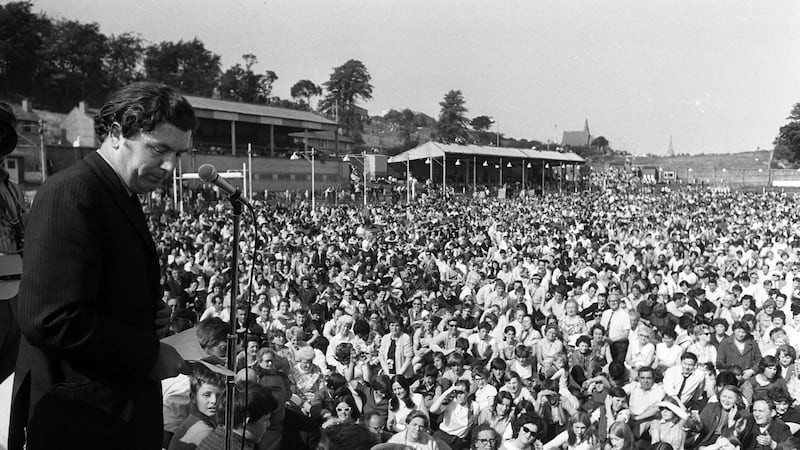Jurors at the rape trial of two Ireland rugby internationals were not told about a pornographic video exchange hours after the alleged attack.
The clip showing a so-called "spitroast" was sent from Rory Harrison to Stuart Olding two hours after they ate lunch at a Belfast cafe on June 28 2016.
But after legal argument Judge Patricia Smyth ruled the footage of two men and a woman, not connected to the case, having consensual group sex should not be shown to the court.
"At this stage the prejudicial effect of evidence outweighs the probative value," the judge said.
Details of the video can only be made public after reporting restrictions on the case were lifted.
The issue was raised about half way through the nine-week trial.
A defence barrister for Paddy Jackson also cautioned if the clip was admitted his team may have to scour the internet for other clips of group sex.
Brendan Kelly QC said: "We would be forced to explore whatever we could to adduce other incidents of group sex which involved three or more people where there is no penile penetration. That's a perfectly proper line of inquiry if that particular video goes before the jury at this stage."
Read more: Stuart Olding's defence barrister tried to have trial halted over Naomi Long tweet
Protesters say they will hold legal and lawful demonstration at the home of Ulster Rugby
Ireland and Ulster players Paddy Jackson (26) and Stuart Olding (25) were unanimously acquitted of rape by a jury which deliberated for three hours and 45 minutes.
Jackson was also found not guilty of sexual assault.
Blane McIlroy (26) was found not guilty of exposure and Rory Harrison (25) was acquitted on perverting the course of justice and withholding information.
Prosecutors had wanted the video to be included as evidence of a conspiracy to concoct a cover story in the event of a complaint being made by the woman at the centre of the case.
Toby Hedworth QC said: "The significance of this video is that it is sent by Mr Harrison to Mr Olding just over two hours after all four defendants have met up that lunchtime at Soul Food."
Later he added: "The video, we submit, provides evidence of what they had been discussing otherwise it is a remarkable coincidence.
"We submit this is highly relevant in respect of the overall case as it was being discussed by all four defendants as to what occurred earlier that same morning, and when one considers in particular Mr Olding's difficulty apparently knowing what Mr Jackson had been doing and Mr Harrison claiming not to know what had occurred upstairs.
"There are two sides as to how Mr Harrison was playing this game in the aftermath.
"It is important that the jury see what Mr Harrison was doing that morning.
"Was he being concerned genuinely, or was he enjoying with his friends what had gone on after their discussion about it at the Soul Food restaurant?
"It is highly relevant to this case as a whole but it is particularly relevant to Messrs Olding and Harrison."
Objections from defence legal teams included argument that the video could amount to prejudicial bad character evidence.
Frank O'Donoghue QC, representing Olding, said there was "no evidence" his client had opened the video.
The lawyer added: "It was not a video of the actual events of the previous evening.
"The probative value of adding this material is negligible to the free standing prosecution case against Mr Olding."
Gavan Duffy QC, representing Harrison, argued there was "no evidence" of any conspiracy and he suggested the prosecution was making an "outrageous speculative connection".
He asked: "What's the relevance?"
Meanwhile, Mr Kelly QC said the sole issue in the case was consent.
"Although I have not seen it, the fact that one co-defendant sent the other co-defendant not jointly charged, a video of consensual act is probative of what?"
After overnight consideration, the judge ruled the video should not be admitted because it may have an adverse effect on proceedings, was irrelevant and could be prejudicial.
- Protesters say they will hold legal and lawful demonstration at the home of Ulster Rugby
- Stuart Olding's defence barrister tried to have trial halted over Naomi Long tweet
- Rory Best appearance at rugby rape trial sparked social media frenzy
- Reporting restrictions lifted with agreement of acquitted men







